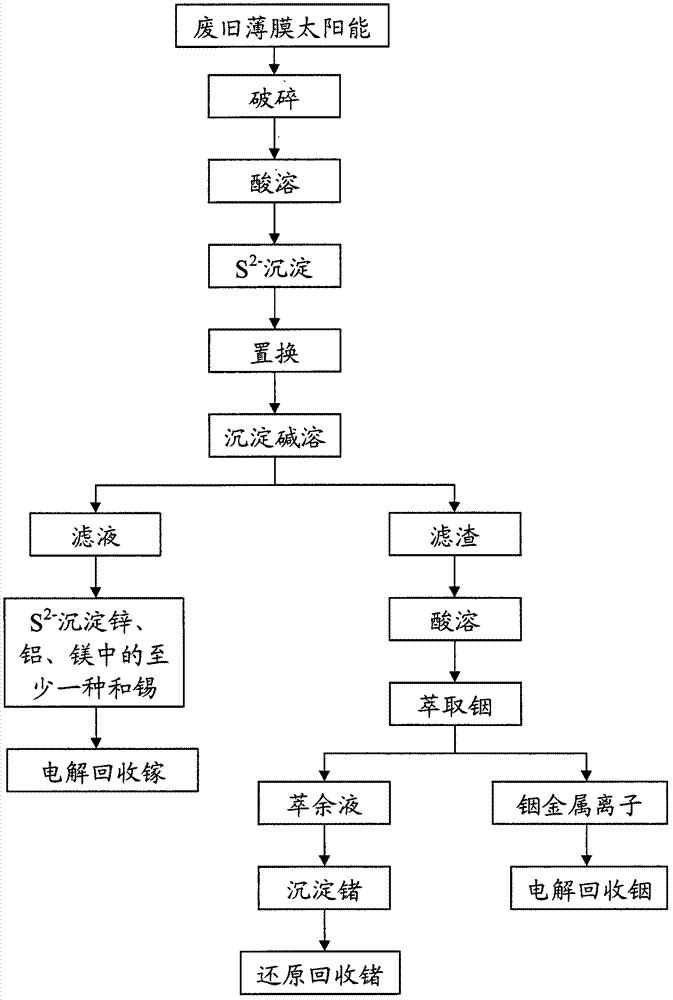Method for recycling gallium, indium and germanium from wasted thin-film solar cells
A technology for solar cells and thin films, applied in the field of recycling gallium, indium, and germanium, can solve the problems of inhibiting the recycling of waste thin-film solar cells, low efficiency, complicated processes, etc., and achieve the effects of reducing recycling costs, improving recycling efficiency, and simple process.
- Summary
- Abstract
- Description
- Claims
- Application Information
AI Technical Summary
Problems solved by technology
Method used
Image
Examples
Embodiment 1
[0053] A method for reclaiming gallium, indium and germanium from waste thin film solar cells, the specific steps are as follows:
[0054] Step S11. Obtain the first separation liquid containing gallium, indium, germanium, cadmium, copper, tin, zinc metal ions:
[0055] Add the pulverized waste thin-film solar cell powder with a particle size of 0.5 to 1 mm into a mixed solution of sulfuric acid and nitric acid containing an oxidizing agent, stir at a speed of 100 r / min and react at 80°C for 6 hours, then perform solid-liquid separation, and collect gallium-containing , indium, germanium, cadmium, copper, tin, the first separation liquid of zinc metal ion; Wherein, in the mixed solution of sulfuric acid and nitric acid, hydrogen ion concentration is 1mol / L, and the molar ratio of sulfuric acid and nitric acid is 1: 0.4, The solid-to-liquid ratio of the mixed solution of waste thin-film solar cell powder and sulfuric acid and nitric acid is 1g: 2ml; Oxidant is sodium chlorate, ...
Embodiment 2
[0069] A method for reclaiming gallium, indium and germanium from waste thin film solar cells, the specific steps are as follows:
[0070] Step S21. Obtain the first separation liquid containing gallium, indium, germanium, cadmium, copper, tin, zinc metal ions:
[0071] This step is referring to step S11 among the embodiment 1, difference is: the rotating speed of stirring is 60r / min, and the temperature of reaction is 60 ℃, and the reaction time is 10 hours; The hydrogen ion concentration in the mixed solution of sulfuric acid and nitric acid is 0.7mol / L, the molar ratio of sulfuric acid and nitric acid is 1: 0.3, the solid-liquid ratio of the mixed solution of waste thin film solar cell powder and sulfuric acid and nitric acid is 1g: 1ml; Oxidant is hydrogen peroxide, and its quality is the mass of thin film solar cell powder 0.1 times;
[0072] Step S22. Obtaining the second separating liquid:
[0073] This step refers to step S12 in Example 1, the difference is: the pH ...
Embodiment 3
[0086] A method for reclaiming gallium, indium and germanium from waste thin film solar cells, the specific steps are as follows:
[0087] Step S31. Obtain the first separation liquid containing gallium, indium, germanium, cadmium, copper, tin, zinc metal ions:
[0088] This step is referring to step S11 among the embodiment 1, difference is: the rotating speed of stirring is 200r / min, and the temperature of reaction is 99 ℃, and the reaction time is 3 hours; The hydrogen ion concentration in the mixed solution of sulfuric acid and nitric acid is 0.5mol / L, the molar ratio of sulfuric acid and nitric acid is 1: 0.6, the solid-to-liquid ratio of waste thin film solar cell powder and the mixed solution of sulfuric acid and nitric acid is 1g: 3ml; Oxidant is potassium permanganate, and its quality is thin film solar cell 0.1 times the mass of the powder;
[0089] Step S32. Obtaining the second separating liquid:
[0090] Refer to step S12 in Example 1 for this step, the differe...
PUM
 Login to View More
Login to View More Abstract
Description
Claims
Application Information
 Login to View More
Login to View More - R&D Engineer
- R&D Manager
- IP Professional
- Industry Leading Data Capabilities
- Powerful AI technology
- Patent DNA Extraction
Browse by: Latest US Patents, China's latest patents, Technical Efficacy Thesaurus, Application Domain, Technology Topic, Popular Technical Reports.
© 2024 PatSnap. All rights reserved.Legal|Privacy policy|Modern Slavery Act Transparency Statement|Sitemap|About US| Contact US: help@patsnap.com








